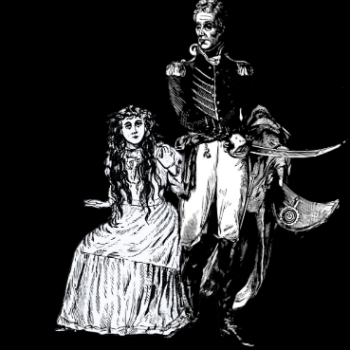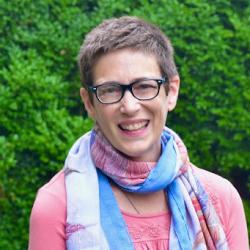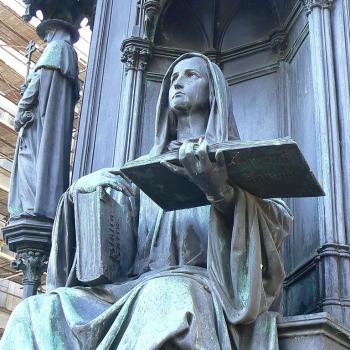To the extent Hirsi Ali mourns injustice and works to alleviate suffering, she walks "in the path of the prophets," as eastern Patriarch Timothy I, eager to be conciliatory, once described the Islamic prophet Muhammad to Abbasid Caliph al-Mahdi. Correspondingly, wherever she cares for the downtrodden and gives voice to the voiceless, she is "not far from the kingdom of God," as Jesus said of a wise interlocutor in Mark 12:34.
Ultimately in Nomad, instead of aggressively opposing Christianity, Hirsi Ali asks, "Can the various churches of Christianity help stem this rising tide of violent Islam?" She adds, "I hope my friends Richard Dawkins, Sam Harris, and Christopher Hitchens -- the esteemed trinity of atheist activists in Britain and the United States -- will not be dismayed by the idea of a strategic alliance between secular people and Christians." Astonishingly, she suggests if not implores:
Churches should begin dawa [evangelism, or witnessing in Islam] exactly as Islam does . . . go into Muslim communities, provide services just as radical Muslims do: build . . . schools, hospitals, and community centers . . . don't just leave this in the hands of governments -- take an active role. . . . Teach hygiene, discipline, a work ethic, and also what you believe in.
Hirsi Ali calls on Christians not only to implement social services, because unlike radical Islamists, "moderate churches do not offer spiritual guidance but only practical help. I think they should do both." She advises reaching out to Muslim asylum seekers and immigrants, some of whom will convert to Christianity: "I would be willing to bet that those people, and their children, have been subsequently far less receptive to the hateful message of the jihadi Muslims." Along the same lines, Prison Fellowship founder Chuck Colson once warned that failure to support ministry and evangelism within prisons often meant surrendering prisoners to a realm of persuasion where "jihadists and other radical groups . . . [are] the only game in town." But most jarring is this:
Christian leaders now wasting precious time and resources on a futile exercise of interfaith dialogue with . . . self-appointed leaders of Islam should redirect their efforts to converting as many Muslims as possible to Christianity, introducing them to a God who rejects Holy War and who has sent his son to die for all sinners out of love for mankind.
For Christians, Hirsi Ali's exhortation to evangelism cuts to the heart. Yet one need not be a Christian, nor agree with her assessment of "futile" interfaith dialogue, to share her hope that "Converts to Christianity would have recognized the radicals when they arrived and resisted the siren song of jihad."
Although Hirsi Ali recommends Christianity to Muslims, she has not embraced Christianity herself. If intellectual skepticism holds her back, I wonder if she has perused the essays of fellow feminist Dorothy L. Sayers, the popular British playwright and mystery novelist, and one of the first female graduates of Oxford University. In "The Greatest Drama Ever Staged," Sayers reiterates an argument by J. R. R. Tolkien and others who were instrumental in wooing her friend, colleague, and former atheist C. S. Lewis back to Christianity.
Sayers argues that while pagan and fictional stories, such as Aeschylus' The Eumenides, contain accounts of reconciling humans and the divine through divine suffering, "in most theologies, the god is supposed to have suffered and died in some remote and mythical period of prehistory. The Christian story, on the other hand, starts off briskly in St. Matthew's account with a place and a date." Lewis, for his part, considered redemptive myths from pagan sources as "good dreams" whose noblest elements echo and are fulfilled truly in Jesus. Christianity was, for Lewis, "myth become fact."
Lewis also offers a solid Christian approach to defining and evaluating Miracles, and he turns the argument of "wishful thinking" back on Freud by musing that atheists themselves may be motivated by the wishful thinking that no one holds them ultimately accountable. Maybe the near universal longing for God is not a neurosis after all: "If I find in myself a desire which no other experience in this world can satisfy, the most probable explanation is that I was made for another world."
When I read bestsellers by the New Atheists, I frequently feel a reader's affection mingled with melancholy when they employ their literary talents not to glorify but to obscure or caricature God. So too with Hirsi Ali. My prayer for her is that she will continue to contemplate and reconsider the better God she tentatively commends to others in Nomad -- a God who shares her adopted name (Ali means "Exalted" in Arabic); a God who is the true and best Abeh, whose love exceeds the love of all earthly parents (Isaiah 49:15); who yearns to adopt Hirsi Ali as his own daughter; and who invites her prodigal friends Dawkins, Harris, and Hitchens to return home as sons.



